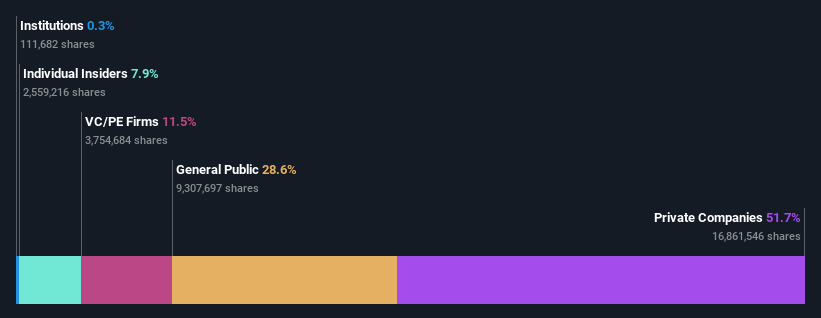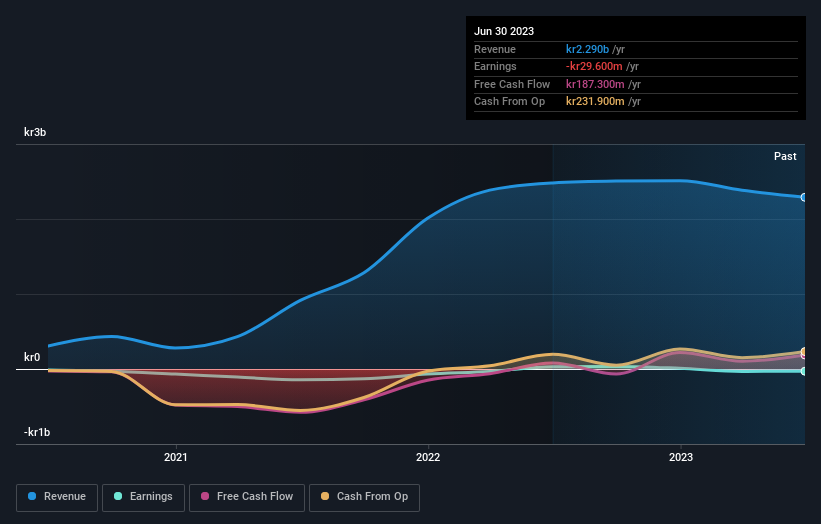Private companies among Endúr ASA's (OB:ENDUR) largest shareholders, saw gain in holdings value after stock jumped 11% last week

Key Insights
- Significant control over Endúr by private companies implies that the general public has more power to influence management and governance-related decisions
- A total of 25 investors have a majority stake in the company with 45% ownership
- Ownership research, combined with past performance data can help provide a good understanding of opportunities in a stock
If you want to know who really controls Endúr ASA (OB:ENDUR), then you'll have to look at the makeup of its share registry. The group holding the most number of shares in the company, around 52% to be precise, is private companies. Put another way, the group faces the maximum upside potential (or downside risk).
As a result, private companies collectively scored the highest last week as the company hit kr1.4b market cap following a 11% gain in the stock.
Let's take a closer look to see what the different types of shareholders can tell us about Endúr.
View our latest analysis for Endúr

What Does The Lack Of Institutional Ownership Tell Us About Endúr?
Small companies that are not very actively traded often lack institutional investors, but it's less common to see large companies without them.
There could be various reasons why no institutions own shares in a company. Typically, small, newly listed companies don't attract much attention from fund managers, because it would not be possible for large fund managers to build a meaningful position in the company. Alternatively, there might be something about the company that has kept institutional investors away. Endúr might not have the sort of past performance institutions are looking for, or perhaps they simply have not studied the business closely.

We note that hedge funds don't have a meaningful investment in Endúr. Looking at our data, we can see that the largest shareholder is Bever Holding As with 6.4% of shares outstanding. In comparison, the second and third largest shareholders hold about 6.3% and 5.5% of the stock. Jorn Ryberg, who is the third-largest shareholder, also happens to hold the title of Member of the Board of Directors. Additionally, the company's CEO Jeppe Raaholt directly holds 0.6% of the total shares outstanding.
Our studies suggest that the top 25 shareholders collectively control less than half of the company's shares, meaning that the company's shares are widely disseminated and there is no dominant shareholder.
Researching institutional ownership is a good way to gauge and filter a stock's expected performance. The same can be achieved by studying analyst sentiments. Our information suggests that there isn't any analyst coverage of the stock, so it is probably little known.
Insider Ownership Of Endúr
The definition of an insider can differ slightly between different countries, but members of the board of directors always count. Company management run the business, but the CEO will answer to the board, even if he or she is a member of it.
Most consider insider ownership a positive because it can indicate the board is well aligned with other shareholders. However, on some occasions too much power is concentrated within this group.
Our most recent data indicates that insiders own some shares in Endúr ASA. It has a market capitalization of just kr1.4b, and insiders have kr107m worth of shares, in their own names. This shows at least some alignment, but we usually like to see larger insider holdings. You can click here to see if those insiders have been buying or selling.
General Public Ownership
With a 29% ownership, the general public, mostly comprising of individual investors, have some degree of sway over Endúr. While this size of ownership may not be enough to sway a policy decision in their favour, they can still make a collective impact on company policies.
Private Equity Ownership
With an ownership of 12%, private equity firms are in a position to play a role in shaping corporate strategy with a focus on value creation. Sometimes we see private equity stick around for the long term, but generally speaking they have a shorter investment horizon and -- as the name suggests -- don't invest in public companies much. After some time they may look to sell and redeploy capital elsewhere.
Private Company Ownership
It seems that Private Companies own 52%, of the Endúr stock. It's hard to draw any conclusions from this fact alone, so its worth looking into who owns those private companies. Sometimes insiders or other related parties have an interest in shares in a public company through a separate private company.
Next Steps:
It's always worth thinking about the different groups who own shares in a company. But to understand Endúr better, we need to consider many other factors. Consider for instance, the ever-present spectre of investment risk. We've identified 2 warning signs with Endúr (at least 1 which is potentially serious) , and understanding them should be part of your investment process.
If you would prefer check out another company -- one with potentially superior financials -- then do not miss this free list of interesting companies, backed by strong financial data.
NB: Figures in this article are calculated using data from the last twelve months, which refer to the 12-month period ending on the last date of the month the financial statement is dated. This may not be consistent with full year annual report figures.
Valuation is complex, but we're here to simplify it.
Discover if Endúr might be undervalued or overvalued with our detailed analysis, featuring fair value estimates, potential risks, dividends, insider trades, and its financial condition.
Access Free AnalysisHave feedback on this article? Concerned about the content? Get in touch with us directly. Alternatively, email editorial-team (at) simplywallst.com.
This article by Simply Wall St is general in nature. We provide commentary based on historical data and analyst forecasts only using an unbiased methodology and our articles are not intended to be financial advice. It does not constitute a recommendation to buy or sell any stock, and does not take account of your objectives, or your financial situation. We aim to bring you long-term focused analysis driven by fundamental data. Note that our analysis may not factor in the latest price-sensitive company announcements or qualitative material. Simply Wall St has no position in any stocks mentioned.
About OB:ENDUR
Endúr
Operates as a supplier of construction and maintenance projects, services, and solutions for marine infrastructure businesses in Norway and the Norwegian Continental Shelf, Sweden, and internationally.
Exceptional growth potential and fair value.


